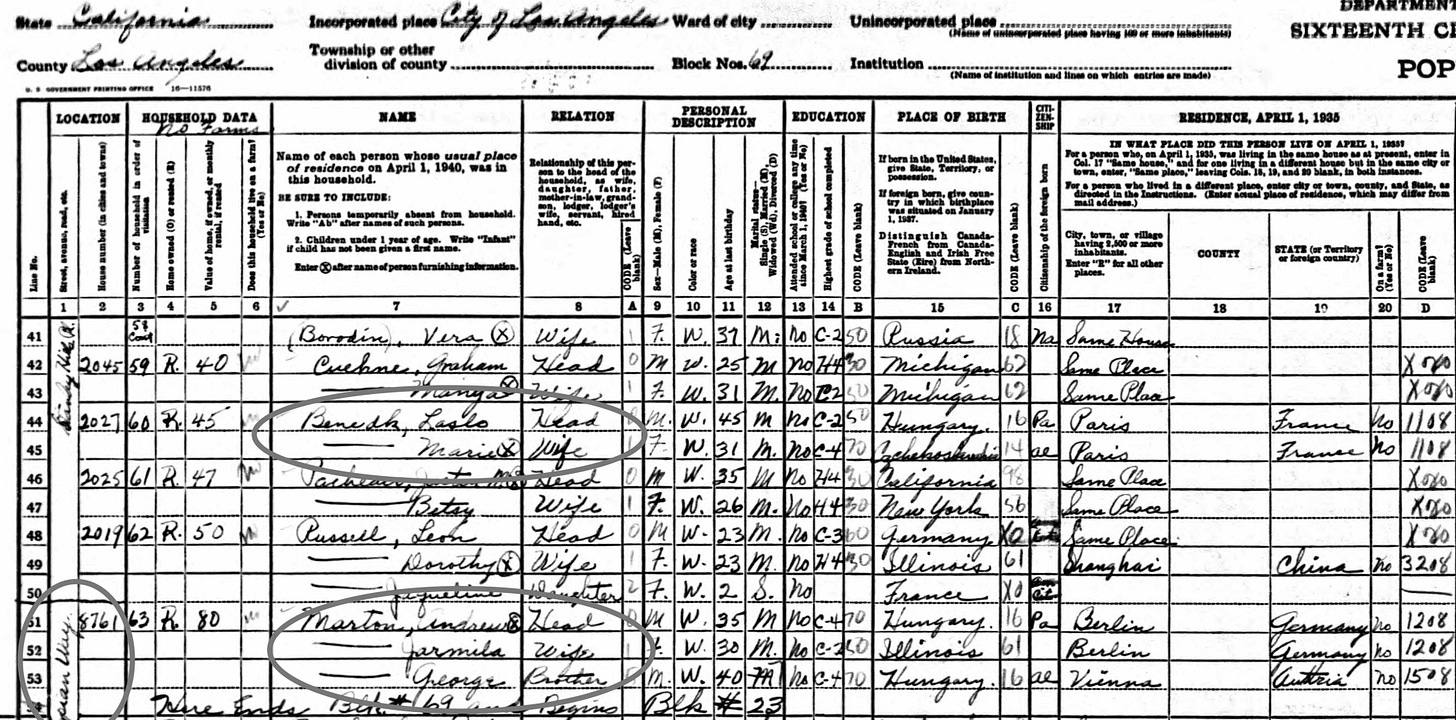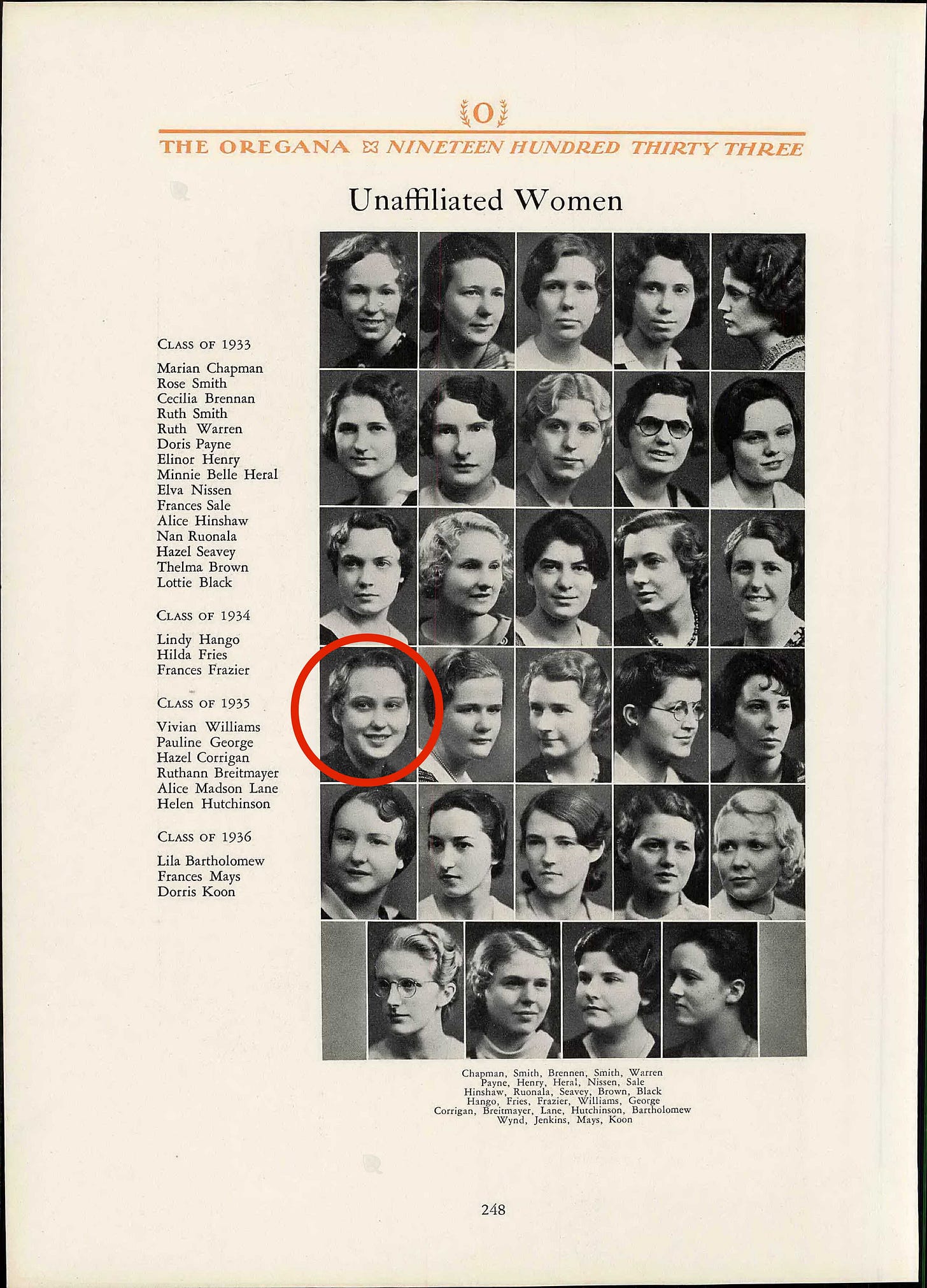I’ve discovered the wonders of the 1940 US census. I’ve never used the US census as a historical source before (normally, I research the mid-18th century — before there was a US census) and there is so much interesting data. I didn’t realize, for example, that the census recorded whether someone owned or rented a house (thanks, Sarah, for pointing that out!), or where they were living five years earlier. Plus, the census records information about education, occupation, and income.
With the data from the 1940 census, I’ve been able to track down a lot of details about Opapa’s time in Los Angeles in 1939-41, when he was a newly arrived Hungarian emigrée and student at UCLA.
In my last post, for example, I wondered who lived at 8761 Appian Way — this was the address that Opapa’s family used to send letters to him and Laci in late 1939 and early 1940. Using the 1940 census, I was able to identify the main residents of the home: Andrew Marton, his wife Jarmila Marton, and his brother George Marton. All three had emigrated within the previous five years from Germany or Austria and they were renting the house. Andrew Marton, like Opapa, was a Hungarian Jew born in Budapest. Like Laci, he was in the film industry. In 1954, he and Laci would go on to found a production company with another Hungarian emigrée, Ivan Tors. Marton is best known for directing the chariot scene in Ben Hur and his archive (note to my future self) is located at the Margaret Herrick Library in Los Angeles.

By the time of the 1940 census, we can also see that Laci was living down the street from Marton and his family: his address was 2027 Stanley Hills road, about .5 miles from 8761 Appian Way — close enough that both Laci and the Martons were on the same page of the 1940 census. Laci was living with his wife, Marie, who was listed as being from Czeckoslovakia. Both Laci and Marie were listed as “Screen Writers” in the census report, though only Laci had worked the previous year — he reported that he worked a total of 6 weeks, and earned $700.
What this tells me is that when Opapa first arrived in Los Angeles, in December 1939, he was surrounded by people with similar backgrounds: Hungarians (most of whom were also Jewish) who loved the arts.
In early 1940, however, Opapa moved closer to the UCLA campus, presumably so he could attend classes. He ended up becoming a lodger in someone else’s home:
Here, you can see “Gerbner, George” listed as a “lodger” in the home of "Hango, U.C.,” a 35-year old white man from North Dakota, along with his sister, Lindy Hango, who was 26-years old. The (x) next to Lindy’s name indicates that she was the person providing the information to the census worker.
Who were these people? What was it like for Opapa to be there lodger?
Here is what I discovered: Lindy, like her brother U.C., was born and raised in North Dakota. But unlike her brother, she went to college: she is listed as having four years of undergraduate education. Her brother, by contrast, is listed as having an 8th grade education.
With this information, it wasn’t too hard to find Lindy Hango’s college yearbook: she graduated from the University of Oregon in 1934, and this was her yearbook photo (her picture is circled):
After college, Lindy Hango moved to Los Angeles, where she moved in with her older brother. In 1935, she and U.C. were living in Glendale, a city just north of downtown LA. At some point in the next few years, they moved to 10352 1/2 Wiltshire Blvd, just 1 mile from the UCLA campus. UC Hango was working as a mail carrier, working about 43 hours per week. He worked 52 weeks in 1939, earning $2,100. Lindy did housework and occasionally worked as a singer in a café. She is listed as earning $250 in 1939 for 5 weeks of work. Opapa, their lodger, is listed as a student with no income.
I don’t know how much Opapa saw UC and Lindry, but they would have shared a kitchen and, possibly, a bathroom. If Lindy was a singer, she and Opapa shared an interest in the arts. Perhaps Opapa told her about the Hungarian folk songs he had recorded in Rimóc just a few years earlier. Maybe he showed them his zither, and played some tunes on it.
But even if they had a few things to talk about, I can’t help but think that Opapa must have been lonely living with the Hangos: he was removed from both UCLA student life and the Hungarian emigré community. His parents and brother were a world away in Budapest, and the war had started. Opapa was safe — for now — but he was a stranger in someone else’s home. It must have been a difficult time.
***
Nuts to crack:
How long did Opapa live with the Hangos? Some of the letters addressed to Opapa in 1940 are addressed to c/o Hango, but I’m not sure if he stayed as a lodger the entire time he was in LA (until summer 1941).
Any secondary source reading recommendations for LA culture during this period? About Hungarians in the film industry? About life at UCLA during the war? I don’t know much about these topics, but they will be important for fleshing out Opapa’s story.






You must read Salka Viertel’s memoir, and also The Sun and Her Stars: Salka Viertel and Hitler’s Exiles in the Golden Age of Hollywood. I have both and am happy for you to borrow them!
Wow! I never knew a ny of this! You're probably right that this was a tough time for opapa.